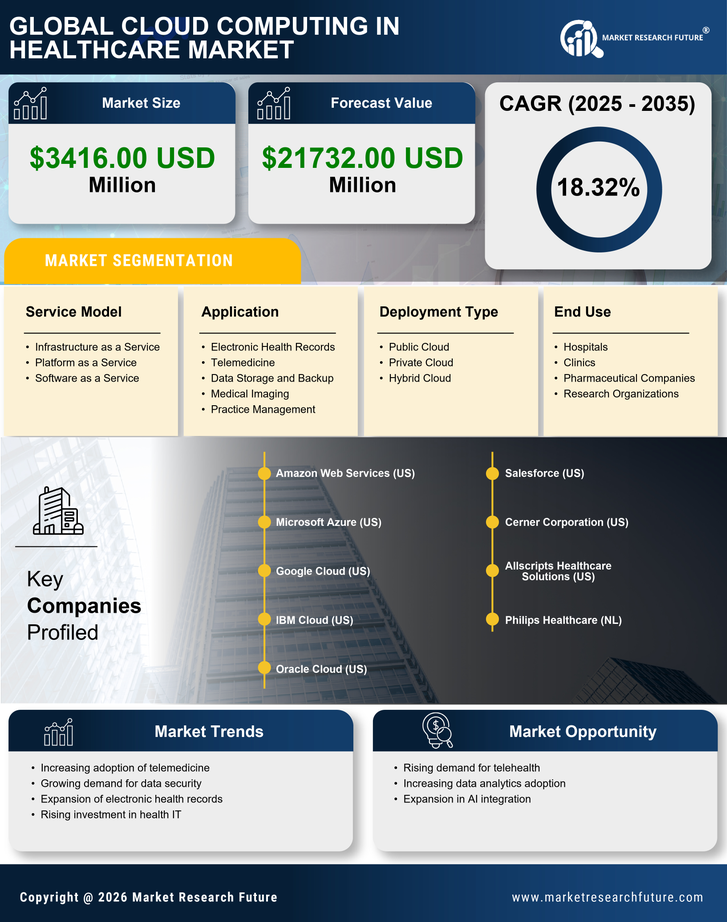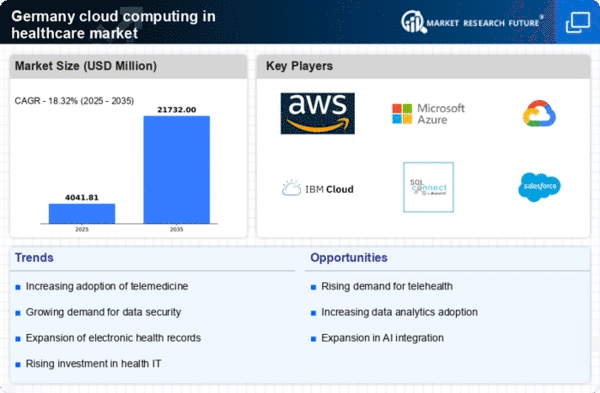Rising Focus on Data Interoperability
Data interoperability is becoming a critical driver for the cloud computing-in-healthcare market in Germany. As healthcare systems evolve, the need for seamless data exchange among various stakeholders is paramount. Cloud-based solutions offer the potential to integrate disparate data sources, enabling healthcare providers to access comprehensive patient information. This capability is essential for improving care coordination and enhancing clinical decision-making. Recent studies indicate that approximately 70% of healthcare organizations in Germany are prioritizing interoperability initiatives. Consequently, the demand for cloud computing solutions that facilitate data sharing and integration is expected to rise, further propelling the growth of the market.
Growing Demand for Remote Patient Monitoring
The cloud computing-in-healthcare market is experiencing a surge in demand for remote patient monitoring solutions. This trend is driven by the increasing prevalence of chronic diseases in Germany, which necessitates continuous health monitoring. According to recent statistics, approximately 30% of the German population suffers from chronic conditions, leading to a heightened need for effective management solutions. Cloud-based platforms facilitate real-time data collection and analysis, enabling healthcare providers to monitor patients remotely. This not only enhances patient engagement but also reduces hospital readmission rates. The integration of these technologies into healthcare systems is expected to drive significant growth in the cloud computing-in-healthcare market, as providers seek to improve patient outcomes while managing costs effectively.
Regulatory Support for Digital Health Initiatives
The cloud computing-in-healthcare market in Germany benefits from robust regulatory support aimed at promoting digital health initiatives. The German government has implemented various policies to encourage the adoption of digital health technologies, including the Digital Healthcare Act. This legislation provides financial incentives for healthcare providers to integrate digital solutions, including cloud-based systems, into their practices. As a result, healthcare organizations are increasingly investing in cloud computing solutions to comply with regulatory requirements and enhance service delivery. The market is projected to grow as more providers leverage these incentives to adopt innovative technologies that improve patient care and operational efficiency.
Cost Efficiency and Scalability of Cloud Solutions
The cloud computing-in-healthcare market is significantly influenced by the cost efficiency and scalability offered by cloud solutions. Healthcare organizations in Germany are increasingly recognizing the financial benefits of transitioning to cloud-based systems. By adopting cloud technologies, providers can reduce infrastructure costs, minimize maintenance expenses, and scale their operations according to demand. A recent analysis suggests that healthcare organizations can save up to 25% on IT costs by utilizing cloud services. This financial incentive, coupled with the flexibility to adapt to changing healthcare needs, positions cloud computing as a viable solution for many healthcare providers, thereby driving market growth.
Enhanced Collaboration Among Healthcare Stakeholders
Collaboration among healthcare stakeholders is a pivotal driver for the cloud computing-in-healthcare market in Germany. Cloud-based platforms facilitate communication and information sharing among various entities, including hospitals, clinics, and research institutions. This enhanced collaboration is crucial for improving patient care and advancing medical research. As healthcare providers increasingly recognize the value of collaborative approaches, the demand for cloud solutions that support these interactions is likely to grow. The ability to share data securely and efficiently among stakeholders not only enhances patient outcomes but also fosters innovation within the healthcare sector, thereby contributing to the expansion of the cloud computing-in-healthcare market.

















